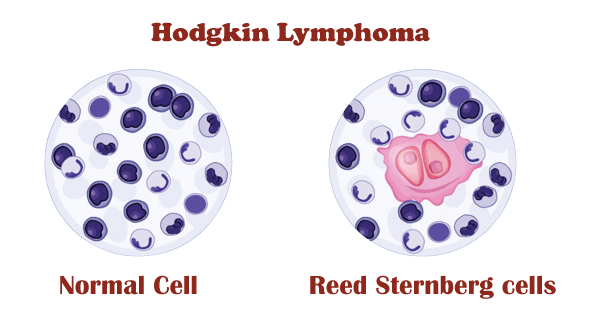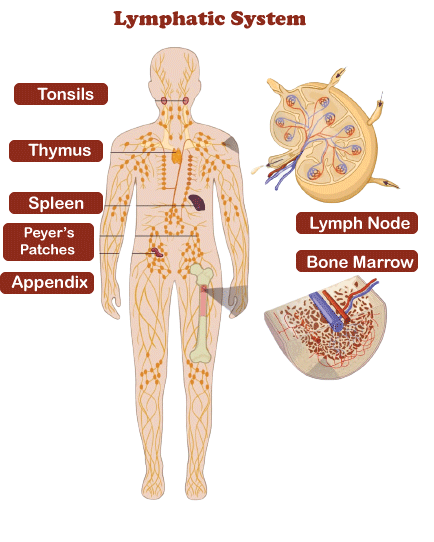Difference between Hodgkin and Non Hodgkin LymphomaAn important component of the body's immune system, the lymphatic system, is impacted by the cancerous condition known as lymphoma. Lymphoma comes in two basic varieties: non-Hodgkin lymphoma (NHL) and Hodgkin lymphoma (HL). Although they are both types of lymphoma, they have significant differences in their characteristics, symptoms, diagnosis, and treatment. In this article, we explore the major differences between these terms. Before going into the differences, let us first understand both Hodgkin and non-Hodgkin lymphoma separately: What is Hodgkin Lymphoma?
Hodgkin is the name of a lymphatic system-related malignancy called Hodgkin's lymphoma. It bears Thomas Hodgkin's name, a physician who originally identified the condition in 1832. The Reed-Sternberg cell, a particular kind of aberrant cell seen in lymph nodes, is a defining feature of Hodgkin's lymphoma. The immune system may get weakened by this cancer's ability to invade further bodily organs. Symptoms of Hodgkin's lymphoma may include enlarged lymph nodes, fever, weight loss, night sweats, and fatigue. Hodgkin's lymphoma is often treated with a mix of chemotherapy, radiation treatment, and other targeted medicines, and the outlook is typically favorable, particularly if it is identified early and treated quickly. Hodgkin's lymphoma is a relatively rare cancer, accounting for about 10% of all lymphomas diagnosed. It typically affects younger people, with the peak incidence occurring in the early 20s and again in the elderly population. The exact causes of Hodgkin's lymphoma are not known, but there are some risk factors that have been identified, such as a weakened immune system, exposure to certain viruses, and a family history of the disease. Diagnosis of Hodgkin's lymphoma usually involves a biopsy of an affected lymph node, followed by imaging tests and other laboratory tests to determine the extent and stage of the disease. Hodgkin's lymphoma treatment is based on the patient's general health, the amount of the illness, and their medical history. In general, treatment for Hodgkin's lymphoma has a high success rate, and many patients can achieve long-term remission or even be cured of the disease with appropriate therapy. What is Non-Hodgkin Lymphoma?
The lymphatic system, a component of the body's immune system that aids in the defense against illnesses and infections, is a target of Non-lymphoma Hodgkin's (NHL), a particular kind of cancer. Lymphocytes are a subset of white blood cells that aid in the body's ability to fight infections, and the term "NHL" is used to denote a group of malignancies that arise in them. NHL can develop from either B-cells or T-cells, and there are many different subtypes of NHL based on the specific type of lymphocyte that is affected. NHL is more common than Hodgkin's lymphoma, accounting for about 90% of all lymphomas diagnosed. The exact cause of NHL is not known, but there are several risk factors that have been identified, such as a weakened immune system, exposure to certain viruses, and some types of chemicals and pesticides. Symptoms of NHL may include swollen lymph nodes, fever, night sweats, weight loss, and fatigue. NHL can also affect other organs in the body, such as the bone marrow, liver, or spleen, which can lead to other symptoms. Diagnosis of NHL usually involves a biopsy of an affected lymph node, followed by imaging tests and other laboratory tests to determine the extent and stage of the disease. The kind and stage of NHL, together with the patient's general health and medical background, all affect how the illness is treated. Chemotherapy, radiation therapy, targeted therapy, and/ or a combination of these treatments are all potential courses of action. The prognosis for NHL varies depending on the type and stage of the disease, but overall, treatment for NHL has improved in recent years, and many patients can achieve long-term remission or even be cured completely of the disease with appropriate therapy. Hodgkin vs. Non-Hodgkin LymphomaLet us now find out the notable differences between Hodgkin's and non-Hodgkin lymphoma with the help of the following table, which makes it easy to differentiate between them swiftly:
ConclusionIn conclusion, Hodgkin lymphoma and non-Hodgkin lymphoma are two types of cancer that affect the lymphatic system. While they share some similarities, such as their origin in lymphocytes and their potential to spread to other parts of the body, they also have important differences. Having Reed-Sternberg cells distinguishes Hodgkin lymphoma from non-Hodgkin lymphoma, which can have a wide variety of subtypes and spread more widely. Hodgkin lymphoma also has a tendency to expand more predictably. Treatment options and prognosis also vary between these two types of lymphoma. If you suspect you may have lymphoma, it's important to see a healthcare provider who can help you determine the type and stage of your disease and develop an appropriate treatment plan accordingly.
Next TopicDifference between
|
 For Videos Join Our Youtube Channel: Join Now
For Videos Join Our Youtube Channel: Join Now
Feedback
- Send your Feedback to [email protected]
Help Others, Please Share










